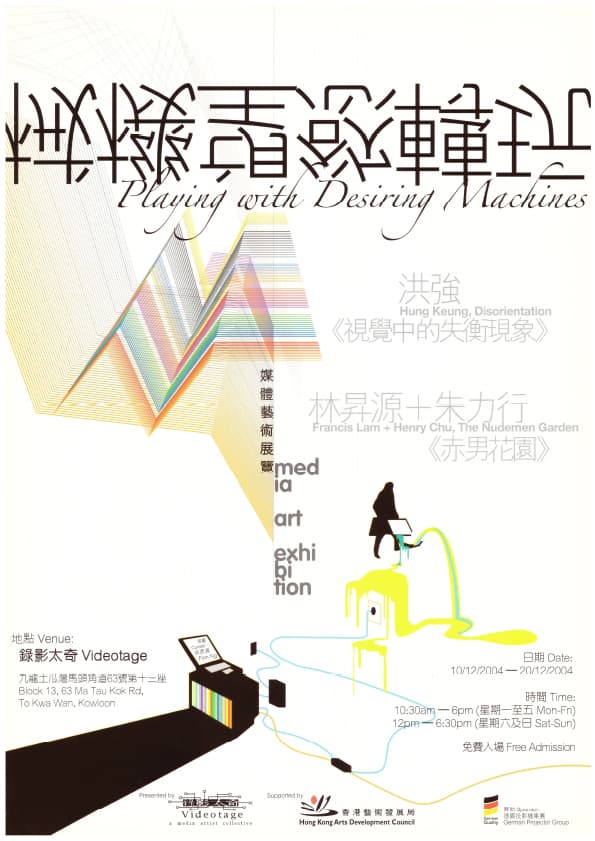Playing with Desiring Machines玩轉慾望機器
This exhibition originally is for the contemporary art exhibition presented by Hong Kong Arts Development Council. The original intention is to gather four local media art works (other two include Bryan Chung’s Be a Hong Kong Patriot, part 2: The Fuzzy Wenker,and Christopher Lau & Kar Fai Samnson Young s Fitue/ Mechine just have been exhibited in the Microwave International Media Art Festival 2004) attempt to present the recent development of Hong Kong media art. Also I want to take this chance to initiate the discussion on the necessity of local media art development, to reveal it as an independent medium in the government funding mechanism but not attach to visual art or film. The original title is “ERROR: Playing with Desiring Machines”. Unexpectedly, “ERROR” becomes true occurring on the presenter. Now the works can be exhibited, but the meaning of ERROR has lost, so I delete it.
In the culture of expense in modern capitalism, the science and technology caters the “desire” of the consumer which becomes psychological even physiological “needs” that cannot be substituted. It decomposes our identity. Jacques Lacan had already in 1954 emphasized that in todays world, is owned by machines.
“Desiring-machines” is, quoted from Gilles Deleuze and Felix Guattari (Anti-Oedipus, 1972), a combination of various elements and forces of all types. It suggests to de-nomalize and de-individualize, to transform human relationships through a multiplicity of new, collective arrangements against power.
The background of The Nudemen Garden is the overwhelming amount of pornography on the Internet. Studies have concluded that 12% of all websites are of a pornographic nature, most of them showing naked women designed for a male audience. Only a very few such sites are oriented on women’s tastes, and most of the ones that sexually exploit men in this manner target homosexual users. At the same time, we’re bombarded daily with countless spam e-mails featuring pornographic content.
In The Nudemen Garden, a huge selection of naked men will fall down to viewer’s body. After The Nude Men Show and Nudemessanger, Francis and Henry continue to call attention to this problem in a sarcastic, witty way.
Hung Keung’s Disorientation is a machine for seeing, “get connected” to the computer by joystick. It is as if space is eclipsed into time and captures the body as an avatar driven system. It is possible to pose a reversed metaphor that does not present the computer as a model of logic but breaks out the uncontrollable elements in the body.
“Playing with Desiring Machines” combines the innovative uses of technology with a sincere, yet playful consideration for human sensitivities in the digital age. The artists experiment with computers integrating with web camera, custom sensors, video tracking systems and software programming develop a new perspective on the relationship of human and machines scattered throughout the exhibition.
本展覽原本是應香港藝術發展局一個胎死腹中的當代藝術展覽而來。原意是集合四件本地媒體藝術作品 (另外兩組作品:鍾緯正 《做爱國港人之二:模糊自慰隊》及劉柏基、楊嘉輝《祭祀機器》剛在早前的微波國際媒體藝術節中展出了),嘗試去勾劃香港媒體藝術的新近發展,及有意特顯媒體藝術在政府撥款機制中是應該被看作為獨立的界別,而不是模稜兩可地游走於視覺藝術與電影之間,希望能引發討論要正視其發展必要。原來的題目是《ERROR: 玩轉慾望機器》,ERROR竟然由揶揄變成事實發生在原先的主辦者身上。柳暗花明,作品被展覽了 ,ERROR則變得無意義,於是我決定刪掉它。
在現代資本主義的消費文化中,科技迎合消費者的 「慾望」成為不可取代的心理甚至生理 「需要」 ,分解我們的身分。拉康早於1954年已經強調今天的世界會被機械所擁有,引述德勒茲與瓜塔里的 《反奥狄帕斯》(1972),「慾望機器」是各種各樣的元素和力量的組合,通過多樣性新及集體安排的反對力量,重新正常化和個人化,來變換人的關係。
林昇源與朱力行的作品背景是互聯網上過量的色情。研究認為,有百份之十二的網站是含有色情成份,大多數顯示裸女的設計了為男性觀眾,只有少數以女性口味為主,而多數以同機手法剝削男性的則以同性戀者用戶為目標。同時,我們每日被不計其數的色情電 子郵件發送砲擊。《赤男花園》中觀眾被一大班裸男從天而降地包圍,是繼 《The Nude Men Show》和 《Nudemessanger》 後,對這個問題用一種諷刺、機智的方式表達。
洪強的 《視覺中的失衡現象》是一件為看見、用遊戲搖桿「連接」到電腦的機器。它是好像空間被触入時間中,以身體作為具體驅動系統。它是不以電腦作為邏輯模型的一個被扭轉的隱喻 。將身體無法控制的元素顯現出來。
處身在數碼時代,「玩轉慾望機器」結合對技術的創新用途、嬉戲的角度考慮人的敏感性。藝術家試驗用電腦結合網照相機、感應器、鐌影跟蹤系統和軟件程式,表達對人和機械的關係另一種新看法。
event details /
Date: 10 -20 December 2004
Time: 10:30am – 6pm (Mon – Fri), 12pm – 6:30pm (Sat – Sun)
Venue: Videotage
Selected Artists Involved: Hung Keung, Francis Lam, Henry Chu
